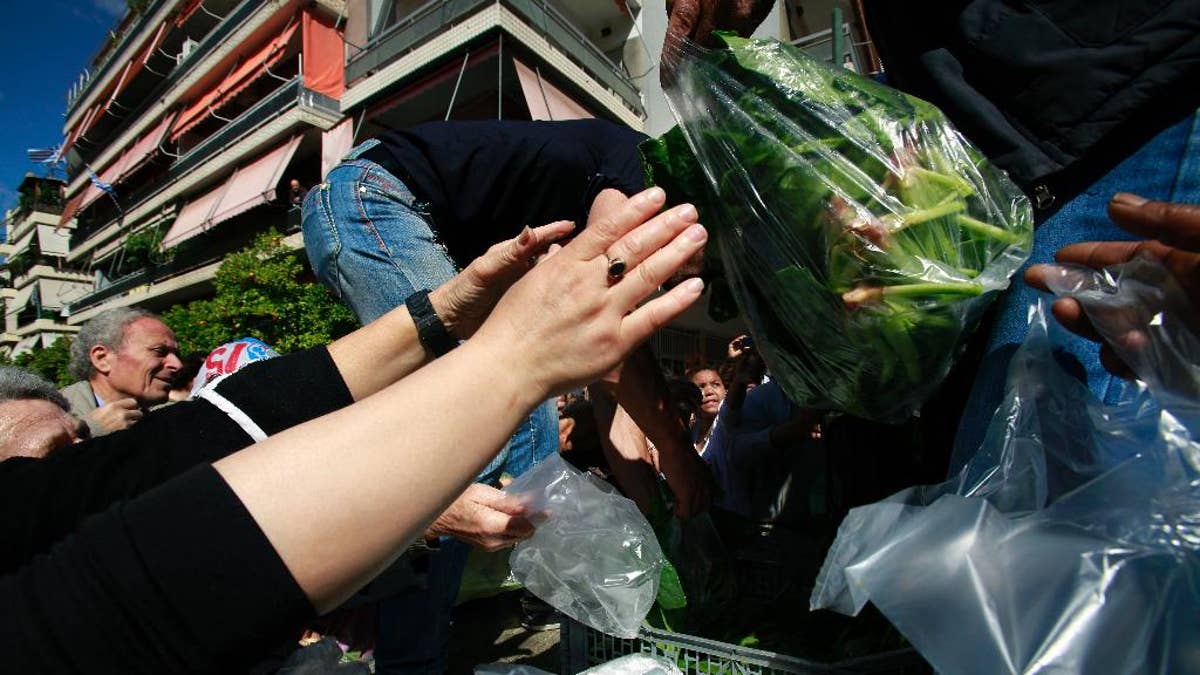
Greek farmers' market vendors distribute free produce as part of a protest in Athens, Wednesday, April 30, 2014, after their trading association launched an indefinite strike Monday. The market vendors are the latest professional group in Greece to protest a sweeping liberalization drive demanded by rescue creditors. (AP Photo/Dimitri Messinis) (The Associated Press)
ATHENS, Greece – Greece's will achieve better-than-expected budget figures in 2014 year but that unemployment would only decline slowly over the coming four years, the country's finance ministry said Wednesday.
The ministry said it expects to achieve a primary budget surplus — what's left after debt and interest payments — of 2.3 percent of the country's annual economic output, up from its previous prediction of 1.5 percent. By 2018, it expects to post a primary surplus of 5.3 percent in 2018.
Achieving a primary surplus has been one of the main purposes of the austerity medicine the country has taken over the past few years.
After being locked out of international bond markets in 2010, Greece has relied on billions of euros of bailout funds from its partners in the eurozone and the International Monetary Fund. In return it has had to impose tough spending cuts and tax rises alongside a wide-ranging economic reform program in order to get its public finances into shape and get Greece in a position to stand on its own again.
"Greece is entering a period of stability after many difficult years for businesses and households, and this was accomplished after great sacrifices," Deputy Finance Minister Christos Staikouras said. "The country has safeguarded its place in Europe and regained international credibility. We have met and surpassed our program targets."
The figures were released as part of a revised 2015-2018 budget plan submitted to parliament.
Even though Greece has made progress on the budget front, its economy will take a long time from the battering it has taken over the past few years. Though Greece is poised to start growing again soon after a recession that's left the economy around 25 percent smaller, progress is expected to be slow.
The ministry predicted that unemployment would only fall below 20 percent in 2016 from the current 28 percent or so. By 2020, unemployment is expected to be 15.9 percent, still around double the rate it was before the crisis started.
The social cost of the recession and the rise in unemployment has been acute across the country of around 11 million people.
In several neighborhoods around Athens, thousands of residents gathered Wednesday to receive free food handouts by outdoor market vendors who launched an indefinite strike this week to protest new operating rules.
The shake-up in market rules has triggered strikes and legal protests from a variety of professions — from pharmacy owners to licensed sex workers.
Greece's conservative-led governing coalition is facing a major midterm test at municipal and European Parliament elections next month, with the left-wing opposition vowing to topple the government.
"Yes, people are angry," opposition leader Alexis Tsipras said in a campaign speech late Tuesday. "They are angry with those who in the name of competitiveness condemned ... thousands of companies to closure and hundreds of thousands of families to despair."
